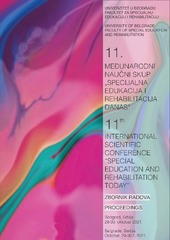Приказ основних података о документу
Humor kao moćno sredstvo u stručnom radu sa decom
Humour as a powerful tool in professional work with children
| dc.creator | Šuster, Jelena | |
| dc.creator | Petrović, Ivan | |
| dc.date.accessioned | 2021-11-05T09:43:02Z | |
| dc.date.available | 2021-11-05T09:43:02Z | |
| dc.date.issued | 2021 | |
| dc.identifier.isbn | 978-86-6203-150-1 | |
| dc.identifier.uri | http://rfasper.fasper.bg.ac.rs/handle/123456789/3769 | |
| dc.description.abstract | Uvod: U uvodnom delu rada bavićemo se pojmom humora, njegovim aspekti- ma, teorijskim osnovama za primenu u praktičnom smislu, kao i načinima im- plementiranja u stručnom radu, usmeravajući se na korisnike usluga iz sistema socijalne zaštite koji podrazumevaju smeštaj u ustanovu. Cilj: Cilj ovog rada jeste da se prikaže da je humorom moguće prožeti veliki broj intervencija, kako planiranih, tako i neplaniranih, situacionih u radu sa decom i da je, svakako, prisutan u svakom segmentu planiranog rada sa korisnicima, te da se ostvaruje pozitivan efekat prilikom uspostavljanja međusobnog od- nosa poverenja stručnog radnika i korisnika, kao i stvaranja osećaja sigurnosti kod korisnika. Nakon uspostavljanja ovakve baze stručnog rada, svaki dalji segment, do završetka rada sa korisnikom inkorporira humor kao deo daljeg stručnog rada (korekcija ponašanja, sniženje tenzije u, za korisnika, provocira- jućim situacijama, distrakcije i distanciranja u situacijama preplavljenosti, po- moć pri prihvatanju raznovrsnih neplaniranih tranzicija na životnom putu i sl.). Metod: Za potrebe ovog naučnog rada korišćena je metoda analize dokumen- tacije, tj. pregleda dostupnih naučnih radova na tematiku kojom se bavi ovaj rad. Rezultati: Kroz ovaj deo rada će se prikazati već primećeni pozitivni efekti upotrebe humora u stručnom radu sa korisnicima, kao i odgovarajući načini primene istog kroz prizmu iskustva stručnih radnika iz sistema socijalne za- štite. Dodatno, istaći ćemo i karakteristike stručnih radnika sistema socijalne zaštite, te posedovanje smisla za humor kompetencije u poslovima koji imaju direktne veze sa decom i maloletnicima, kao i sposobnost podsticanja smisla za humor korisnika sa kojima rade. Zaključak: Kroz zaključak će se obraditi pozitivni efekti primene humora kroz navedene intervencije i segmente stručnog rada na promene u ponašanju kod korisnika usluga. | sr |
| dc.description.abstract | Introduction: In the introductory part of the paper, we will deal with the concept of humour, its aspects, theoretical foundations for its application in practical terms, as well as ways of its implementation in professional work, while focusing on users of social protection services that include accommodation in an institution. Aim: The goal of this paper is to show that humour can be a part of a large number of interventions, both planned and unplanned, situational that are implemented while working with children and that it is present in every segment of planned work with users where it helps to achieve a positive effect in establishing mutual relationship of trust between the professional worker and the user, as well as creating a sense of security for the user. After establishing such working base, humour is incorporated in each further segment of professional work until the end of providing services to the child (correction of problematic behaviour, reduction of tension in provocative situations for the child, distractions and distancing in overwhelming situations, providing help in accepting various unplanned transitions on the path of life, etc.). Method: For the purpose of this scientific paper, the method of documentation analysis was implemented through review of available scientific papers on this topic. Results: This part of the paper will present the positive effects of using humour in professional work with users as well as its application, that have already been noticed in scientific papers, seen through the experience of professionals from the social protection system. In addition, we will emphasize the characteristics of professionals in the social protection system, and their possession of a sense of humour as one of the most important personal qualities in jobs that have direct links with children and minors, as well as the ability to encourage a sense of humour in those users. Conclusion: The conclusion will address the positive effects of the application of humour through these interventions and segments of professional work on changes in behaviour among children. | sr |
| dc.language.iso | sr | sr |
| dc.publisher | Univerzitet u Beogradu – Fakultet za specijalnu edukaciju i rehabilitaciju/ University of Belgrade – Faculty of Special Education and Rehabilitation | sr |
| dc.rights | openAccess | sr |
| dc.rights.uri | https://creativecommons.org/licenses/by-sa/4.0/ | |
| dc.source | Zbornik radova 11. Međunarodni naučni skup Specijalna edukacija i rehabilitacija danas Beograd, 29–30. oktobar 2021. godine | sr |
| dc.subject | humor | sr |
| dc.subject | intervencija | sr |
| dc.subject | korisnici usluge | sr |
| dc.subject | stručni rad | sr |
| dc.subject | humour | sr |
| dc.subject | intervention | sr |
| dc.subject | social service users | sr |
| dc.subject | professional work | sr |
| dc.title | Humor kao moćno sredstvo u stručnom radu sa decom | sr |
| dc.title | Humour as a powerful tool in professional work with children | sr |
| dc.type | conferenceObject | sr |
| dc.rights.license | BY-SA | sr |
| dc.citation.epage | 106 | |
| dc.citation.spage | 101 | |
| dc.identifier.fulltext | http://rfasper.fasper.bg.ac.rs/bitstream/id/4267/bitstream_4267.pdf | |
| dc.identifier.rcub | https://hdl.handle.net/21.15107/rcub_rfasper_3769 | |
| dc.type.version | publishedVersion | sr |


